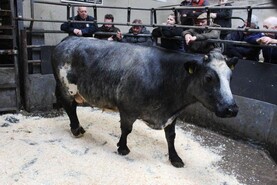Lyons sets out new NI energy strategy
A Stormont Executive energy strategy aimed at achieving net zero carbon and affordable energy by 2050, has been published by Minister for the Economy Gordon Lyons.
The high-level document notes that energy used for the likes of transport, electricity generation and to heat our homes currently accounts for 60% of NI greenhouse gas emissions.
In the short term, the strategy targets a 56% reduction in energy-related emissions relative to 1990 levels by 2030.
Some of that reduction has already been achieved, with the latest figures for 2018 showing emissions are down 21%, but despite that, rapid progress will have to be made this decade.
Three key targets are set to 2030.
Those include making existing buildings more energy efficient, with government expected to provide “a significant contribution” by supporting improvements such as retrofitting.
There is also a target to have 70% of electricity from renewables by 2030 (45%
at present) and to double
the size of the low carbon
and renewable energy economy.
The strategy document highlights the need to phase out fossil fuel use for both heating and transport, and talks up the potential of hydrogen, with a centre of excellence in research and innovation to be created in NI.
Time running out on sheep inventory
Sheep farmers are reminded that the DAERA annual flock inventory must be completed online by 30 December 2021.
The Department warns that failure to complete the inventory increases the likelihood of an on-farm identification inspection.
To complete the inventory, which can be accessed using DAERA’s online services, flockowners must provide details of sheep on their holding between 1 and 5 December 2021.
This data must also be recorded in the on-farm flock register.
Read more
Farmer Writes: so many questions on fertiliser
UK lamb throughput in November 11% lower year on year
Lyons sets out new NI energy strategy
A Stormont Executive energy strategy aimed at achieving net zero carbon and affordable energy by 2050, has been published by Minister for the Economy Gordon Lyons.
The high-level document notes that energy used for the likes of transport, electricity generation and to heat our homes currently accounts for 60% of NI greenhouse gas emissions.
In the short term, the strategy targets a 56% reduction in energy-related emissions relative to 1990 levels by 2030.
Some of that reduction has already been achieved, with the latest figures for 2018 showing emissions are down 21%, but despite that, rapid progress will have to be made this decade.
Three key targets are set to 2030.
Those include making existing buildings more energy efficient, with government expected to provide “a significant contribution” by supporting improvements such as retrofitting.
There is also a target to have 70% of electricity from renewables by 2030 (45%
at present) and to double
the size of the low carbon
and renewable energy economy.
The strategy document highlights the need to phase out fossil fuel use for both heating and transport, and talks up the potential of hydrogen, with a centre of excellence in research and innovation to be created in NI.
Time running out on sheep inventory
Sheep farmers are reminded that the DAERA annual flock inventory must be completed online by 30 December 2021.
The Department warns that failure to complete the inventory increases the likelihood of an on-farm identification inspection.
To complete the inventory, which can be accessed using DAERA’s online services, flockowners must provide details of sheep on their holding between 1 and 5 December 2021.
This data must also be recorded in the on-farm flock register.
Read more
Farmer Writes: so many questions on fertiliser
UK lamb throughput in November 11% lower year on year






 This is a subscriber-only article
This is a subscriber-only article










SHARING OPTIONS: